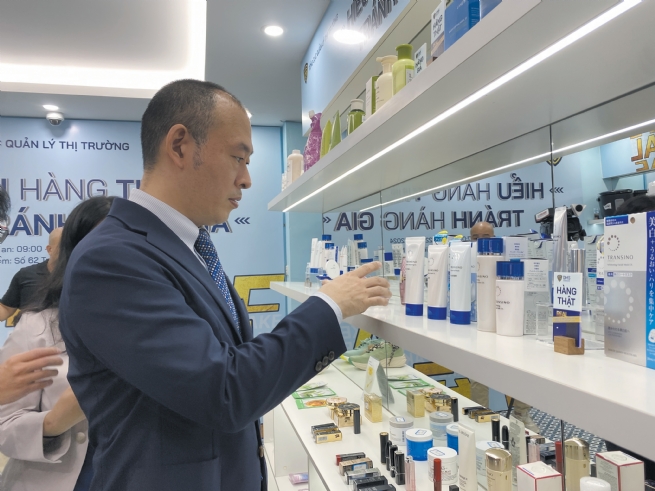9:43:02 AM | 12/16/2024
More than 41,700 cases of counterfeit, fake and smuggled goods have been unearthed and handled by market authorities in the past 10 months.

Avoiding fake goods in the biggest annual sale
A series of brands have launched early discount policies on Black Friday, which takes place at the end of November, because this biggest promotional event stimulates this year’s sales with a discount of up to 70%.
Many shopping streets in Hanoi, particularly those featuring fashion retailers, have begun displaying "Black Friday Sale" billboards to capture the attention of passersby. However, according to statistics, uptake has not been very strong. In addition, in recent years, consumers have switched to preferring online shopping channels, such as social networking sites or e-commerce platforms. The shopping atmosphere has been very exciting. However, perhaps consumers also need to be more vigilant during this occasion because some sellers and merchants will take advantage of this increased purchasing power to mix fake, counterfeit and knockoff goods.
More than 41,700 cases of counterfeit, fake and smuggled goods have been unearthed and handled by market authorities in the past 10 months. To help consumers avoid the risk of buying fake and knockoff goods, on November 22, the Vietnam Directorate of Market Surveillance (DMS) under the Ministry of Industry and Trade (MoIT) launched the “Understanding Genuine Goods - Avoiding Fake Goods” event, a practical activity to respond to the Anticounterfeiting Day (November 29).
Surprisingly, anti-counterfeiting stamps were found to be affixed to counterfeit products. This deceptive tactic has been employed by numerous merchants to mislead consumers. With the use of fake stamps, counterfeit designs and imitated styles, many products are being replicated with increasing sophistication, particularly popular items from Germany, the United States and Japan.
Fostering cooperation
At the event, Ms. Miho Misawa, Director of International Affairs, Daiichi Sankyo Company (Japan), said: “Japanese products are typically trusted by Vietnamese consumers for their quality but when consumers are confused about genuine and fake products. When they use fake products without desirable effectiveness, their trust in the brand will weaken and they may leave. Counterfeit products often have quality not controlled, thus resulting in health risks to consumers.”
Mr. Naito Yasuaki, Director of Intellectual Property at the Japan External Trade Organization (JETRO), said: “We want to strengthen measures to deal with products that pose health risks such as cosmetics and medicines. To do this, it is necessary to have activities to raise awareness of the severity of counterfeit goods for consumers.”
To help consumers compare genuine products and fake ones, DMS displayed more than 450 different products, aiming to provide more knowledge for consumers to avoid buying quality-unguaranteed products that may harm users’ health.
DMS General Director Tran Huu Linh said: “Recently, we have asked the Government for amendments and changes in administrative penalties on counterfeit goods by raising the level of sanctions and penalties to the highest to prevent counterfeiters from making more counterfeit goods. Many consumers buy cheap goods of unclear origin from unreliable sellers because of very good advertising on social networks where they cannot check the authenticity of sellers.”
Previously, on November 7, in Hanoi, DMS also coordinated with the Korean Intellectual Property Office (KIPO) and the Korean Intellectual Property Protection Agency (KOIPA) to organize a workshop on the status and solutions on identification of counterfeit goods and intellectual property-infringed goods from the perspective of South Korean businesses in 2024.
Mr. Jeong In-Sik, Director of the Korean Intellectual Property and International Cooperation Agency, said that these similarities have contributed to strongly bolstering economic cooperation and cultural exchange between Vietnam and South Korea. This proved that Vietnam is an important and third largest partner of South Korea.
The use of counterfeit goods not only hurts genuine businesses but also negatively harms the health and safety of Vietnamese consumers, he added. To firmly tackle this problem, cooperation between countries is needed. Therefore, the event aimed to prevent widespread damage to South Korean businesses caused by counterfeit goods and help protect the health and safety of Vietnamese consumers.
Experts also warned that the year-end shopping demand often increases, so counterfeit goods are often smuggled into the market. Therefore, consumers need to carefully research information, access official websites to learn about products, and buy at trusted addresses.
By Hien Quyen, Vietnam Business Forum